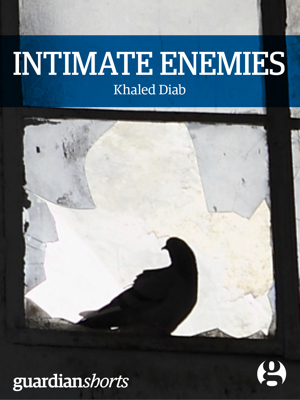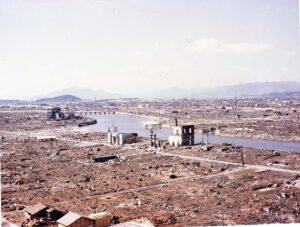Lost in confrontation in the Holy Land
By Khaled Diab
As tensions mount, it's hard to believe that Israelis and Palestinians share a lot in common – even the dreams of their great writers.

Intimate Enemies: Living with Israelis and Palestinians in the Holy Land.
Order here
Monday 10 November 2014
You could tell by the chaos and confusion in the aisles that it was a flight heading back to the Middle East. Passengers milled about noisily in search of space for their excess hand baggage or chatted animatedly by their seats, causing a significant delay as the perplexed cabin crew tried to gain order.
During take-off, an argument broke out between two passengers because one of them was using his mobile phone. Pretty soon, in classic Middle Eastern fashion, others were drawn into the altercation, each contributing their penny's worth on whether or not phones should be switched off.
Despite the familiarity of the scene, this flight was not heading to my hometown of Cairo or any other Arab capital but was destined for Tel Aviv.
What this incident highlights is that the differences between Israelis and Arabs are more about politically coloured perceptions than they are about social or cultural realities, especially when it comes to Israel's Palestinian and Levantine neighbours.
With so little contact between Arabs and Israelis, this will undoubtedly come as a surprise to people on both sides of the political and ideological chasm separating the two sides. But having lived in the Holy Land on and off since 2011, I would hazard to say that, in many crucial respects, Palestinians and Israelis have more in common with each other than they do with their kin further afield, say Gulf Arabs or Diaspora Jews.
That is one reason why I describe the protagonists in this decades-old conflict as “intimate enemies” in my new book: partly because of their close geographical and physical proximity but also because of their surprising social and cultural symmetry.
Confronted with a reality on the ground which conflicts with the simplistic prevalent political narratives, I wrote the book as a modest corrective to all the distrust, misapprehension and miscomprehensions in the air. I am also of the conviction that seeing the human faces behind the conflict is a vital prerequisite to the long process of organic, grassroots peace-building.
The manuscript was well-received by reviewers. One of my favourite responses I received was from the prominent Israeli historian and dissident Ilan Pappè. “I was deeply moved and impressed by the chapters,” he told me. “You are doing justice to their experience, complexities… and impossible reality.”
Palestinians and Israelis share a similar Mediterranean outlook, characterised, among other things, by the central importance of family, child-friendliness and the casual attitude to regulations, from smoking to driving, as if they are recommendations and not actual legislation, not to mention their almost innate distrust of authority. In culinary terms, this is reflected in the Israeli love of hummus and the Palestinian infatuation with schnitzels.
Even Palestinian and Israeli intellectuals share some surprising traits, such as when it comes to their daydreams. One intriguing example is the fantasy entertained by both the late Palestinian-American academic, musician and activist Edward Said and Israeli novelist and activist Amos Oz. “One of my recurrent fantasies… was to be a book, whose fate I took to be happily free of unwelcome changes,” Said wrote in his memoir, Out of Place.
Echoing this sentiment, Oz confessed to me in his study that, as a child, he wanted to “grow up and become a book… because, as a book, I would have a better chance of survival”.
This conflicts with the common Arab perception of Israel as being a slice of Europe transplanted into the region, not to mention the Israeli self-image of being a supposed stronghold of Western enlightenment in the Middle East.
When viewed dispassionately, these similarities, symmetries and parallels are hardly surprising. After all, Palestinians and Israelis have lived side by side for decades and so, even if they regard each other as enemies, they are bound to influence one another.
Add to this the fact that around half of Israel's Jewish population is Mizrahi (Eastern), then Israel's Middle Eastern flavour becomes more comprehensible.
Mizrahi, or “Arab Jews” as many were once known, like the Palestinians, also fell victim to the conflict between Zionist and Arab nationalism – so much so that few Arabs alive today realise that they once shared their societies with a dynamic and integrated Jewish minority.
“When you walked down Baghdad's main street, Al Rashid, half the names on the shops and offices were Jewish,” Sasson Somekh, the accomplished Iraqi-Israeli poet and academic, who helped put the late Egyptian Nobel laureate Naguib Mahfouz on the map of world literature, told me.
“We felt even more Arab than Arabs … We did not feel we belonged to a place but that the place belonged to us,” believes Baghdad-born Israeli author Sami Michael.
But in the unforgiving reality of the conflict having the words Arab and Jew in such overlapping and interwoven proximity was too close for comfort for enemies who sought to take the Arab out of the Jew and the Jew out of the Arab.
But it is not just Mizrahi Jews who find themselves trapped unenviably in the no-man's-land of the conflict, the Palestinian citizens of Israel are also caught in the middle, with one foot on either side of the widening Israeli-Palestinian abyss.
Probably the most famous Palestinian with Israeli citizenship was the late Mahmoud Darwish, whose powerful verse earned him the title of Palestine's national poet. One under-appreciated aspect is the enormous impact growing up in Israel had on Darwish's identity, both negatively and positively.
This was reflected in his love of the Hebrew language, not to mention the passionate love affair he once had with an Israeli woman. And it is this ambiguity in a situation that does not generally tolerate it that makes Palestinians in Israel not just “fifth columnists” in the eyes of their Jewish compatriots but also distrusted among some of their Palestinian brethren.
Only last week, the Mufti of Nablus, Ahmed Shobashi, stirred up anger and calls for his resignation when he demanded that Palestinians in Israel be barred from entering the West Bank because of their “negative moral impact”.
This incident illustrates how the differences within Palestinian and Israeli societies are often greater than the disparities between them. This is reflected in the sharp and polarised secular-religious and right-left divides. In fact, with attention focused on the headline conflict, most overlook the brewing civil strife in both societies which manifests itself, for instance, in the increasing “price tag” attacks by settlers against peace activists and leftists or the bitter Hamas-Fatah schism. That is not to mention the conflicts between the haves and have-nots and those in favour of justice and equality, and those opposed to them.
Despite the significant amount of common social and cultural ground, politically Israelis and Palestinians have perhaps never seemed further apart. This summer turned into a heated season of hate and open warfare.
Even now with hostilities over in Gaza, the situation in the besieged enclave has not changed – except for the massive amounts of wanton destruction there. Meanwhile East Jerusalem and the West Bank witness daily protests and clashes, with al-Aqsa acting as a symbolic centre for the rising tensions.
With the worsening reality on the ground, people may be excused for believing that this conflict will just grind on forever. Although the situation is likely to get a lot worse before it gets better, I believe the status quo is untenable.
The most promising way out of the quagmire, in my view, is what I call the “non-state solution” in which talks of states and statehood are abandoned for the time being in favour of a civil rights struggle for full equality, emancipation and enfranchisement. Once this has been achieved, ordinary Palestinians and Israelis, long sidelined and ignored in efforts to resolve the conflict, can begin a people's peace process in which everyone is involved in the quest for coexistence.
Although it may take generations, I am convinced that a new dawn of peace and justice will come, but this dawn will arrive in gradual glimmers and not in a blaze of blinding sunshine, as many hope or dream.
____
Intimate Enemies: Living with Israelis and Palestinians in the Holy Land
By Khaled Diab
Published by Guardian Shorts, October 2014,
____
Follow Khaled Diab on Twitter.
This article first appeared in The National on 8 November 2014.


